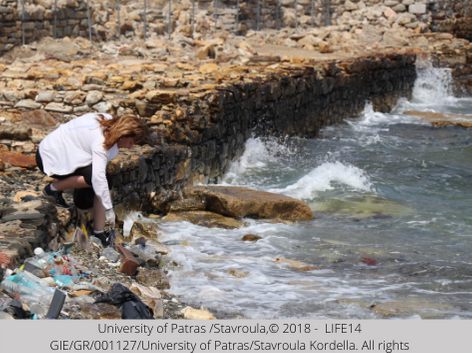
Litter is a major problem for the marine environment, with plastic bags being one of the most common and persistent items. Each year, more than eight million plastic bags end up as litter in the EU. Current recycling rates are only 6.6%, which are difficult to increase because the thinness and lightness of plastic bags means they have a low recycling value. Plastic bags are blown by the wind and washed away by rain and snowmelt into rivers and drainage systems, eventually reaching the marine environment. Threats to marine life from bags, bottles and other plastic waste are due to ingestion and entanglement, causing direct physical damage and possibly toxicological harm. Over 267 animal species are known to suffer from entanglement and ingestion of marine debris, including 86% of sea turtles, 44% of seabirds, and 43% of marine mammals. Plastic waste also constitutes an aesthetic problem in tourist areas such as natural parks and beaches. Since over 80% of marine litter comes from land-based sources, preventing litter at source is very important. However, an integrated approach to tackling plastic waste is lacking, while ignorance remains of its environmental impacts. It is therefore crucial to inform consumers and to promote reusable bags as an alternative to single-use plastic bags.
The main objective of the LIFE DEBAG project was to develop and implement an integrated information and awareness-raising campaign for the prevention and reduction of plastic bag pollution in the marine environment. The aim was to change consumers behaviour. Specifically, the project aimed to improve the knowledge base and create awareness of the problem of plastic bag use and disposal at the national level, and to inform and educate the public on Syros island; ensure a sense of public ownership to build support for relevant measures; improve educational efforts directed towards teachers and pupils; and contribute to changing Greece to a sustainable society, starting with plastic bags.
- Project duration
- 1 Sep 2015 - 31 Jan 2019
- Project locations
- Greece
- Overall budget
- €1 257 540
- EU contribution
- €754 52760% of the overall budget
- Project website
- LIFE Public Database
Results
LIFE DEBAG developed and implemented an integrated information and awareness-raising campaign for the reduction of plastic bag pollution in the marine environment, on a national level in Greece and on a local level on the Greek island of Syros.
On Syros, the project informed more than 41 000 visitors and 16 500 inhabitants of the problems caused by plastic bags in the marine environment, as well as measures to address the issue, for example, through factsheets at hotels and leaflets for the general public. The project team produced 12 000 reusable cotton bags, which were given for free to the local population. Local voluntary agreements to reduce the consumption of plastic bags were signed with 215 local shops in Syros. Educational events were held, such as beach clean-ups, and information materials produced for every school on the island.
The project conducted a rigorous assessment of the marine litter load on the island's beaches and seafloor using drones, towed underwater camera and underwater remote operated vehicles (ROV); results showed that, at the end of the project, the accumulation of plastic bags had decreased by 85% on the surveyed beaches and by 60% on the seafloor. This strongly indicates that an intensive awareness-raising campaign can have a tangible impact on the environment.
At the national level, the projects intensive information campaign, involving TV and radio spots, printed publications and electronic newsletters, and social media, reached approximately 600 000 people. A national voluntary agreement was reached with five supermarket chains (representing more than 50% of Greece's market share), with a variety of measures introduced to reduce plastic bag consumption. The project also organised seven stakeholder consultation forums that brought together for the first time all pertinent stakeholders in Greece. Through these forums, it contributed with a significant set of recommendations for the integration of the ELIFE DEBAG developed and implemented an integrated information and awareness-raising campaign for the reduction of plastic bag pollution in the marine environment, on a national level in Greece and on a local level on the Greek island of Syros.
On Syros, the project informed more than 41 000 visitors and 16 500 inhabitants of the problems caused by plastic bags in the marine environment, as well as measures to address the issue, for example, through factsheets at hotels and leaflets for the general public. The project team produced 12 000 reusable cotton bags, which were given for free to the local population. Local voluntary agreements to reduce the consumption of plastic bags were signed with 215 local shops in Syros. Educational events were held, such as beach clean-ups, and information materials produced for every school on the island.
The project conducted a rigorous assessment of the marine litter load on the island's beaches and seafloor using drones, towed underwater camera and underwater remote operated vehicles (ROV); results showed that, at the end of the project, the accumulation of plastic bags had decreased by 85% on the surveyed beaches and by 60% on the seafloor. This strongly indicates that an intensive awareness-raising campaign can have a tangible impact on the environment.
At the national level, the projects intensive information campaign, involving TV and radio spots, printed publications and electronic newsletters, and social media, reached approximately 600 000 people. A national voluntary agreement was reached with five supermarket chains (representing more than 50% of Greece's market share), with a variety of measures introduced to reduce plastic bag consumption. The project also organised seven stakeholder consultation forums that brought together for the first time all pertinent stakeholders in Greece. Through these forums, it contributed with a significant set of recommendations for the integration of the E
Stakeholders
Coordinators
University of Patras
- Address
- University Campus, 26504 Patras, Greece
- Website
- http://www.upatras.gr/
